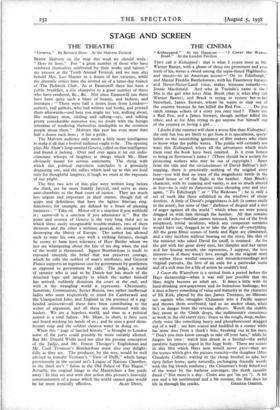THE CINEMA
" Kidnapped." At the Gaumont--" I CoVer the Water- front." At the London Pavilion
THEY call it Kidnapped : that is what. I resent most as Mr. *arner Baxter, with a gleam of those too prominent and even teeth of his, waves a sword among the sepia-tinted Highlanders and shouts—in an American accent—" On to Edinburgh," and Master Freddie Bartholomew, with his Fauntleroy features and Never-Never-Land voice, makes _winsome remarks—to Jennie Macdonald. And who in Tusitala'S name is she ? She is the girl who loves Alan Breck (that is what they call Warner Baxter), ar_d Breck is trying to restore her to her betrothed, James Stewart, whom he wants to Ship out of the country because he has killed the Red Fok. . . Do You catch strange echoes of a story you once read ? There was a Red_ Fox, and a James Stewart, though neither killed the other, and as for Alan trying to get anyone but himself out of the country or loving a girl . . .
. I doubt if the summer will show a worse film than Kidnapped ; the, only fun you are likely to get from it is speculation, specu- lation on the astonishing ignorance of film makers who claim to know what the public wants. The public will certainly not want this Kidnapped, where all the adventures which made them read the book have been omitted. Is it even honest to bring in Stevenson's name ? (There should be a "society for protecting authors who may be out of copyright.) Apart from the title and the circumstances of David BalfoUr's kid- napping, there is practically nothing of the original story here—you will find no trace of the magnificent battle in the round house or of the flight in the heather. Alan Breek's character, with its cunning and vanity, is not so much altered as lost—he is only an American voice shouting over and over again, " To Edinburgh " or " The Redcoats " : he is only a set of teeth like those exhibited in the windows of cheap dentists. A little of David's priggishness is left (it comes-easily to the actor), but none of that "darkness of despair and'i sort of anger against all the world " which when we were Young dragged us with him through the heather. All that remains is an odd echo—familiar names miaused, lines out of the book misplaced, trivial incidents, which any competent< scenarist would have cut, dragged in to. take the place Of--everything. All the great filmic scenes of battle and flight are eliminated, and a 'tiny incident without" bearing on- the story, like that of the minister who asked David for snuff, • is retained. As for the girl with her great dewy eyes, her dimples and her tartan and her kissing mouth, she represents, I suppose, the love interest—as if there wasn't love enough in the original story to wither these wistful caresses and misunderstandings and virginal pursuits, the love of an exile for a particular scene and of a sick man for a life of action he couldn't lead.
I Cover the Waterfront is 'a revival from a period before the Hays dictatorship—when it was still just posSible that the films might become an adult art. It dates a little with its hard-drinking newspapermen and its boisterous badinage, but it does achieve something of value and maturity in the character of Eli Kirk, played by the late James Torrence,• an illiterate sea captain who smuggles Chinamen into a Pacific seaport and throws them overboard, tied • to an anchor chain, when he's in danger from the revenue officers. Watch the stubble face sweat as the Chink drops, the rudimentary conscience at work in the old starry eyes : listen to the rough, deep, melan- choly voice like something heavy and phosphorescent dragged out of a well : see him scared and huddled in a corner while his mate dies from a shark's bite, breaking out at his- men, " Don't you men know enough to take off your hats,". while he forgets his own : watch him drunk in a brothel—the awful paralytic happiness caged in the huge body. There are scenes in this film which Hays now would never pass—they are the scenes which give the picture veracity—the daughter (Miss Claudette Colbert) waiting in the cheap brothel to take her tipsy father home, quite naturally, exchanging friendly words with the big blonde madame ; the Chinaman's body fished out of the water by the harbour scavenger, the death casually dated (" Not more'n a day. Crabs aint got-'inn yet "). A bit raw and a bit sentimental and a bit routine, the film does let


































 Previous page
Previous page